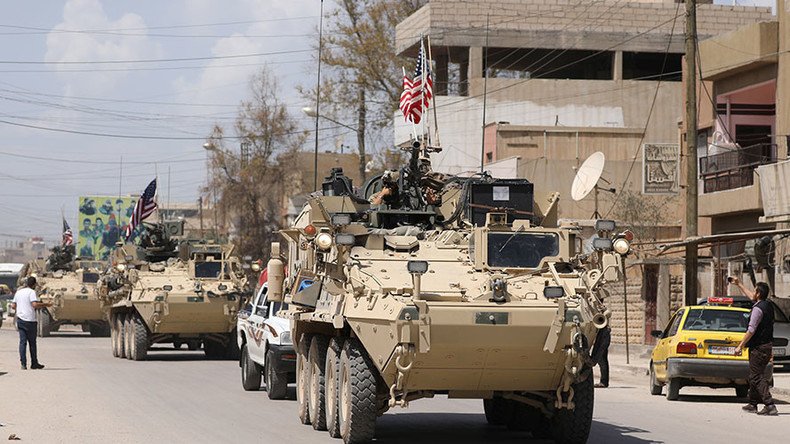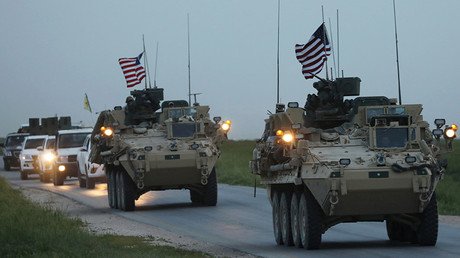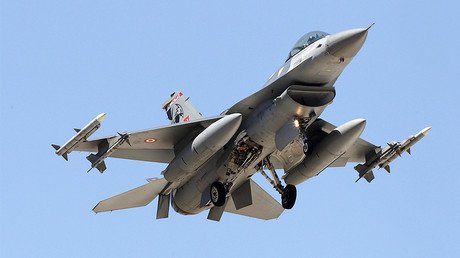‘Turkey learned that playing ball with America is game of ever-diminishing returns’

For five years, Ankara has put itself at the forefront of the American plan to overthrow the government of Syrian President Bashar Assad, and at huge cost to itself, but now it has been completely isolated, says Dan Glazebrook, geopolitical analyst.
US troops were spotted on the move in Syria near the Turkish border. The US Defense Department said that the US deployed their troops there in a bid to prevent clashes between Kurdish units, known as the YPG, and Turkish forces.
RT: Do you think this deployment will help ease tensions between the Turks and Kurds?
Dan Glazebrook: I don’t think they will significantly ease tensions, because this division is almost unstoppable. Defeat inevitably brings about despair and division. That is exactly what we’re seeing amongst all the various partners in the failed Anglo-American war against Syria that’s been raging now for over five years. We’re seeing the failure of the attempts to topple the Syrian government.
It is not too dissimilar from what is happening in Libya, where the various anti-government factions have now coalesced into two different rival kind of groups that are at each other’s throats and on the verge of all our hostilities with each other in Syria as they are actually in full-blown civil war in Libya. So the forces of the Syrian Democratic Front, the Kurdish-led coalition group backed by the US, and Turkey’s proxies, and so on – they both are in this race to get to Raqqa first, to be the ones who retake Raqqa.
If you look at it from the Turkish position, Turkey has been the number-one ally in this regime change project of the US. It has been doing Washington and London’s bidding for over five years at extreme political, diplomatic and economic cost to itself. And now it is on the verge of having all its influence in Syria wiped out; its proxies decimated or marginalized, and the US basically ditching it all together.
So they are very bitter and determined to make sure that they can claw back whatever influence they can. I think that is the real context to see this in. It is not so much about Turkish fears about the YPG, the Kurdish group in Syria, who aid the PKK; it is about their influence in Syria and they want their faction to dominate. The US inserting itself as basically human shields - certain US soldiers are human shields between them - is going to do nothing to deal with the fundamental causes of this tension.
RT: The US has already deployed tanks to Syria to prevent its partners from fighting. Why isn't Washington able to control its own allies? Why does it even have to?
DG: Turkey is moving away, moving out of the US orbit, and that is largely the US’s own fault. As I say the US is basically ditched Turkey. So Turkey is smarting from that. In August, Turkey launched its own invasion of Syria effectively – "Euphrates Shield" - that was followed then in November by the US throwing in all of its chips with the Syrian Democratic Front and deciding it would back them to retake Raqqa.
In February of this year, Turkey made a kind of last ditch attempt to convince the US to put forward proposals for a Turkish-US plan that would involve Turkish-US Special Forces in alliance with the various Turkish-backed militias in Syria to retake Raqqa as an alternative to using the Syrian Democratic Forces. That came to nothing and now the result is what we see.
So Turkey almost I think feels it has not much to lose any more from endangering relations with the US. The US has already effectively ditched it. It feels almost it needs to do what it can to salvage some influence, and playing ball with Washington is a game of ever-diminishing returns. The real lesson that other countries can take from this is look at how the US has treated Turkey. Turkey has for five years put itself at the forefront of this American plan to overthrow Assad, as I say at huge cost to itself. And it has been completely just left and dumped. That is the reality – that there’s no benefit to throwing in your chips and throwing in your lot with these various imperial gambits waged by London and Washington, and so on. They will have no loyalty for you doing that.
Turkey is moving away, moving out of the US orbit, and that is largely the US’s own fault.
RT: What do these developments say about the anti-ISIS coalition itself? How much of a detrimental effect will this have on the fight against ISIS?
DG: Hugely detrimental. Last Tuesday, Turkey killed between 20 and 30 YPG Kurdish fighters and injuring well over a dozen more. Obviously that is now going to divert energies of the Syrian Democratic Forces and of the YPG towards having to deal with effectively a war on two fronts. The whole advance towards ISIS, towards Raqqa, obviously is going to be slowed up, if they’re having to deal with Turkish bombardment. Of course that is absolutely clear. Yes, the war against ISIS will be greatly damaged by this.
The statements, views and opinions expressed in this column are solely those of the author and do not necessarily represent those of RT.














